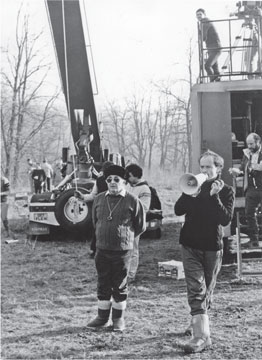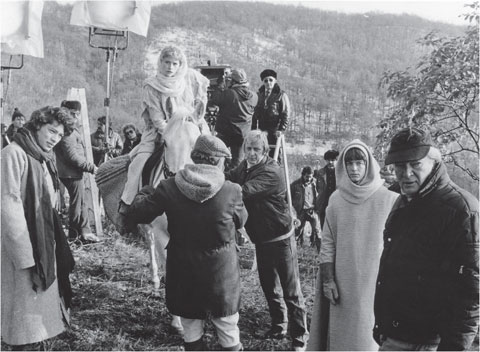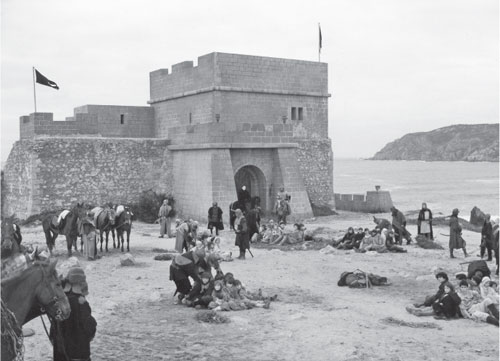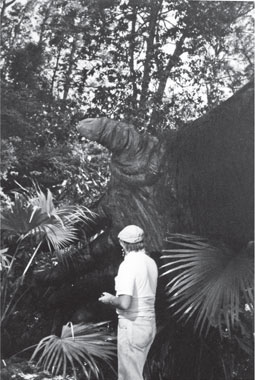Shooting 007: And Other Celluloid Adventures (38 page)
Read Shooting 007: And Other Celluloid Adventures Online
Authors: Sir Roger Moore Alec Mills
Once again our filming would take place on foreign soil, this time in Hungary and Portugal, but sadly there is little of interest to record of
Lionheart
, a simple story of orphans travelling across Europe who are captured by the wicked Black Prince, who then trades the children off as slaves until a young knight on his way to the Crusades decides to sort out this nasty problem. Eric Stoltz, Nicola Cowper, Dexter Fletcher and Deborah Moore set out to protect the orphans, while Gabriel Byrne would prefer to sell them off as slaves to interested parties.
Franklin tried hard to get something from this thin script, which to some extent he succeeded doing, but with the story handed him there was little else anyone could do, even an Oscar-winner. If truth be told, it was a slow uninspiring tale, making it difficult to be complimentary with the director’s efforts and in the end it offered little in the way of entertainment. Roger Moore’s daughter Deborah made a convincing debut in the film. Dad would no doubt be proud of her sword-fighting skills, although you could be sure he would make his tongue-in-cheek humorous comments on Deborah’s effort.

Setting up a crane shot while the Hungarian assistant director Gábor Váradi calls out the instructions.

On location in Hungary, near Visegrad. Franklin Schaffner stands in the foreground on the right, Eric Stoltz is in the hooded cape, Nicola Cowper on the horse and Dexter Fletcher is leftmost in the picture. I am on the ladder next to the camera.

Setting up a scene on location in Portugal where the abducted children have been tied up.
The film received mixed reviews, most of which I remember as being ordinary at best, but at least this was another credit added to my CV, even if it was of little consolation to the poor director, who always carries the can. Nevertheless, an interesting plus came from a ‘lesson-learned’ on our arrival at one early morning location. The set was covered in a low-lying fog, but our tight schedule meant we had to film something, come what may. When I saw the rushes I could not have been more pleased with the mood created by the fog – a cold early morning with a dramatic mist adding to the tragedy of the scene. Although my director was impressed with my work, I wisely decided to share the credit with an outside influence.
I am a romantic who believes that life works in mysterious ways. Usually when strange things happen without reason or explanation we pass them off as coincidence and they are soon forgotten; thinking about this next event, I wondered if it was strangely connected with something which had happened earlier. Does any of this make sense, or am I sounding like some strange weirdo? It gets worse when I ask myself as a free spirit if our lives are planned for us, no matter what profession we choose, but we are left few clues as to how life will play out. We all experience good and bad times, some of which we may well answer for in time – possibly I will go to hell – so why do I write all this nonsense?
My career would eventually move forward in a strange way, but not before an unlikely sequence of events occurred, where an important decision would be made about my future, finally bringing about the traditional fairy-tale ending. It was early one morning, far too early to wake up, but the damn phone kept on ringing. It was the beginning of a set of circumstances that would lead to everything I could possibly wish for or even have dreamed of. The phone call was a short conversation with a strange unnamed voice interested in my availability, and would I be interested in a film in America? If so then someone would call back later with all the details. Still in my sleepy state, I said yes, though my questions would remain unanswered as he quickly rang off.
Okay, this had to be a set-up – a friend disguising his voice, I was foolishly going along with his weird sense of humour. I had smiled when asked about my availability but I was tired and the joke had gone too far and I went back to bed. Later it occurred to me that this might not be a silly prank after all and that someone really had put my name forward for a film. Then some hours later the promised call came, this time from a different voice with instructions to collect my ticket at Heathrow and fly directly to Wilmington, North Carolina; a driver would meet me at the airport. That was it …
Even as I flew across the Atlantic it was still unclear why I had been asked to replace the cinematographer Peter MacDonald on a film. All I knew was that the production was entering its second week of filming and Peter had abruptly been rushed to hospital with appendicitis. Now suddenly here I was, flying to America with many questions still unanswered. My unease came not from any lack of confidence in my ability or the fact that I would be working with a strange American crew, but the fact was I knew nothing about the production or the director.
The penny finally dropped when the unit car driver casually mentioned the name of the director of
King Kong Lives
– John Guillermin – which suddenly began to explain all of the evident secrecy. It would seem that John had asked for me as Peter’s replacement. My mind now started to play games with me – would John remember our war of words on
Death on the Nile
after all this time? Of course he would, so was he taking this opportunity to settle an old score and sack me? I would soon find out.
With my childish overactive mind stirring up this sudden insecurity I was left with persistent thoughts of flying back to the UK on the next available plane. My fears were working overtime as I was taken to the set where filming was in progress with a temporary cinematographer. An assistant director led me to meet John, who at the time was sitting in his director’s chair with a severe look on his face. His eyes were fixed on my approach.

Standing beside King Kong’s huge animatronic hand, it is strange to think that the King Kong miniature from the original 1933 film was only 18 inches tall!
‘Alec. Good to see you; sit down!’
A good start, I thought. We chatted away for fifteen minutes or so without any signs of my early departure back to the UK as my confidence slowly began to return. After a short conversation the assistant director called John back to the set. Was that it? I asked myself.
Not quite … After a few steps John stopped, turning back to me with a penetrating look on his face. Now came the moment of truth: ‘Alec, I seem to recall you have a temper.’
‘Not me, John,’ I shamelessly replied. ‘You’re confusing me with someone else!’
He looked at me, his eyes narrowed … suspicious … not really sure as he considered my reply. Finally, he smiled – perhaps more a smirk, I thought – before turning back to his set. John had seen through my obvious fib, but perhaps it was enough to confuse him.
Overnight I read the script to bring myself up to date for the next morning when I would be introduced to a giant ape going by the name of King Kong. Knowing of John’s capabilities as a director, of which I earlier admitted being an admirer, I doubt that he would have seen this script as anything worthwhile. Nor, indeed, would the followers of the giant ape, all of them believing that King Kong was now past history. It would seem that everyone thought so, apart from the producer Dino De Laurentiis, even when these opinions were echoed in the press. More importantly, John and I worked well together – it would seem that our past flare-up was now forgotten.
Although I had my private concerns about John, I would certainly benefit from this latest opportunity of working with him in Wilmington, where I also enjoyed typical American hospitality with a self-drive car and a condominium on the North Carolina beach. As always with Americans I was made to feel welcome at all times, which helped to repair the Anglo-American relationship damaged after my
Star Wars
experience. However, even with all the courtesy shown to me I doubted that America was where I would choose to work permanently. My reason in mentioning this was that I now had an agent in Los Angeles who promised the earth should I move to the USA. Privately I knew this was not for me as my family back home would always take precedence.
Wilmington Studios could not be compared to Pinewood in size although it was still large enough to service other productions of a similar scale to
King Kong
, and it happened that Ken Adam was also there, working on
Crimes of the Heart
. Ken, of course, was the brilliant production designer who set the high standards on the earlier James Bond films; over the years we would get to know each other well on
The Spy Who Loved Me
and
Moonraker
, where more often than not he would stay close to my camera, making sure that I saw every inch of his beautiful and very expensive sets through the camera lens.
Hearing that I was working on the next stage, Ken came over to see me. I assumed that his interest lay more with the gigantic ape lying powerless on an operating table, but not so. It would seem that Ken had received a phone call from Tom Pevsner, Eon Productions’ associate producer back at Pinewood Studios, about the new James Bond film. Apparently Cubby Broccoli had phoned Ken to ask his opinion about the possibility of me photographing the new 007 film!
I laughed, ‘Yes, yes, pull the other one, Ken!’ What else could I think?
